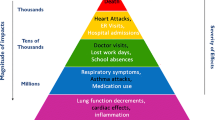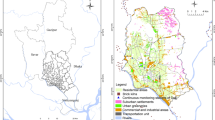Abstract
A differential game of pollution control is considered. The duration of this game is a random variable defined by the instant of the first failure of industrial equipment for any of the players. The game parameters are calculated on the basis of real environmental conditions of Irkutsk oblast. The three largest industrial enterprises of Bratsk, where one of the most acute ecological situation in Russia is observed, are chosen as players. A solution that will improve the general ecological situation in the oblast is proposed.
Similar content being viewed by others
References
Bagno, A.L. and Tarasyev, A.M., Properties of the Value Function in Optimal Control Problems with Infinite Horizon, Vestn. Udmurtsk. Univ., Mat. Mekh. Komp. Nauki, 2016, vol. 26, no. 1, pp. 3–14.
Gromova, E.V. and Petrosyan, L.A., On an Approach to Constructing a Characteristic Function in Cooperative Differential Games, Autom. Remote Control, 2017, vol. 78, no. 9, pp. 1680–1692.
Zakharov, V.V. and Petrosjan, L.A., Matematicheskie modeli v ekologii (Mathematical Models in Ecology), St.-Petersburg: SPb. Gos. Univ, 1996.
Kaverzina, L.A., State of Economy of Municipality of Bratsk during the Post-Crisis Period, Finans. Analit., 2013, vol. 6, no. 48, pp. 24–34.
Kostyunin, S.Yu., Palestini, A., and Shevkoplyas, E.V., On an Exhaustible Resource Extraction Differential Game with Random Terminal Instants, Vestn. St. Petersb. Univ., Ser. 10 Prikl. Mat., Inform., Prots. Upr., 2013, no. 3, pp. 73–82.
Mazalov, V.V. and Rettieva, A.N., Nash Equilibrium in Environmental Problems, Mat. Modelir., 2006, vol. 18, no. 5, pp. 73–90.
Petrosyan, L.A. and Murzov, N.V., Game-Theoretic Problems in Mechanics, Litovsk. Mat. Sb., 1966, no. VI-3, pp. 423–433.
Petrosyan, L.A., Stability of the Solutions of Differential Games with Several Players, Vestn. Leningrad. Univ., 1977, no. 4, pp. 46–52.
Petrosyan, L.A. and Danilov, N.N., Stable Solutions in Nonantagonistic Differential Games with Transferable Payoffs, Vestn. Leningrad. Univ., 1979, no. 1, pp. 46–54.
Petrosyan, L.A. and Shevkoplyas, E.V., Cooperative Differential Games with Random Duration, Vestn. St. Petersb. Univ., Ser. 1 Mat., Mekh., Astronom., 2000, no. 4, pp. 18–23.
Rettieva, A.N., Cooperative Incentive Condition in Bioresource Sharing Problem, Upravlen. Bol’sh. Sist., 2009, no. 26.1, pp. 366–384.
Shevkoplyas, E.V., Stable Cooperation in Differential Games with Random Duration, Mat. Teor. Igr Prilozh., 2012, vol. 2, no. 3, pp. 79–105.
Shevkoplyas, E.V., The Hamilton—Jacobi—Bellman Equation for a Class of Differential Games with Random Duration, Mat. Teor. Igr Prilozh., 2009, vol. 1, no. 2, pp. 98–118.
Breton, M., Zaccour, G., and Zahaf, M., A Differential Game of Joint Implementation of Environmental Projects, Automatica, 2005, vol. 41, no. 10, pp. 1737–1749.
Dockner, E.J. and van Long, N., International Pollution Control: Cooperative vs Noncooperative Strategies, J. Environm. Econom. Manage., 1993, vol. 25, pp. 13–29.
Dockner, E.J., Jorgensen, S., van Long, N., and Sorger, G., Differential Games in Economics and Management Science, New York: Cambridge Univ. Press, 2001.
Gromov, D. and Gromova, E., Differential Games with Random Duration: A Hybrid Systems Formulation, Contrib. Game Theory Manage., 2014, vol. 7, pp. 104–119.
Gromov, D. and Gromova, E., On a Class of Hybrid Differential Games, Dynam. Games Appl., 2017, vol. 7, no. 2, pp. 266–289.
Gromova, E. and Marova, E., On the Characteristic Function Construction Technique in Differential Games with Prescribed and Random Duration, Contrib. Game Theory Manage., 2018, vol. 11, pp. 53–66.
Gromova, E.V., Tur, A.V., and Balandina, L.I., A Game-Theoretic Model of Pollution Control with Asymmetric Time Horizons, Contrib. Game Theory Manage., 2016, vol. 9, pp. 170–179.
Gromova, E.V. and Petrosyan, L.A., On an Approach to Constructing a Characteristic Function in Cooperative Differential Games, Autom. Remote Control, 2017, vol. 78, no. 9, pp. 1680–1692.
Haurie, A. and Zaccour, G., Differential Game Models of Global Environmental Management, in Ann. Dynamic Games, Boston, 1994, pp. 124–132.
Kostyunin, S., Palestini, A., and Shevkoplyas, E., On a Nonrenewable Resource Extraction Game Played by Asymmetric Firms, SIAM J. Optimiz. Theory. Appl., 2014, vol. 163, no. 2, pp. 660–673.
Kostyunin, S. and Shevkoplyas, E., On Simplification of Integral Payoff in Differential Games with Random Duration, Vestn. St. Petersb. Univ., Ser. 10, Prikl. Mat., Inform., Prots. Upr., 2011, no. 4, pp. 47–56.
Marin-Solano, J. and Shevkoplyas, E.V., Non-constant Discounting and Differential Games with Random Time Horizon, Automatica, 2011, vol. 47, no. 12, pp. 2626–2638.
Petrosjan, L.A. and Shevkoplyas, E.V., Cooperative Solutions for Games with Random Duration, in Game Theory and Applications, Hauppauge: Nova Science, 2003, vol. 9, pp. 125–139.
Petrosjan, L. and Zaccour, G., Time-consistent Shapley Value Allocation of Pollution Cost Reduction, J. Econom. Dynamics Control, 2003, vol. 27, no. 3, pp. 381–398.
Pontryagin, L.S., Boltyanskii, V.G., Gamkrelidze, R.V., et al., Matematicheskaya teoriya optimal’nykh protsessov (Mathematical Theory of Optimal Processes), Moscow: Nauka, 1983.
Shapley, L.S., A Value for n-Person Games, in Contributions to the Theory of Games II, Kuhn, W. and Tucker, A.W., Eds., Princeton: Princeton Univ. Press, 1953, pp. 307–317.
Sedakov, A., Characteristic Functions in a Linear Oligopoly TU Game, in Frontiers of Dynamic Games. Static and Dynamic Game Theory: Foundations and Applications, Petrosyan, L., Mazalov, V., and Zenkevich, N., Eds., Boston: Birkhauser, 2018, pp. 219–235.
von Neumann, J. and Morgenstern, O., Theory of Games and Economic Behavior, Princeton: Princeton Univ. Press, 1953.
Weibull, W., A Statistical Distribution Function of Wide Applicability, J. Appl. Mech., 1951, vol. 18(3), pp. 293–297.
Yaari, M.E., Uncertain Lifetime, Life Insurance, and the Theory of the Consumer, Rev. Econom. Stud., 1965, vol. 32, no. 2, pp. 137–150.
Bukhgalterskaya otchetnost’ OAO “RUSAL Bratsk” (Accounting Reports of OJSC RUSAL Bratsk), 2011. https://braz-rusal.ru/
Vikulova, A.A., About a Non-standard Setup of Characteristic Functions in Cooperative Games, St. Petersburg: St. Peterb. Gos. Univ., 2016. http://nauchkor.ru/uploads/documents/587d36565f1be77c40d58cff.pdf
Godovoi otchet otkrytogo aktsionernogo obshchestva “Gruppa Ilim” za 2011 god (2011 Annual Report of OJSC Ilim Group). http://www.ilimgroup.ru/aktsioneram/raskrytie-informatsii/godovji-otchet/
Gosudarstvennyi doklad “O sostoyanii i ob okhrane okruzhayushchei sredy Irkutskoi oblasti v 2011 godu” (State Report “On the Condition and Protection of Environment in Irkutsk Oblast in 2011”). http://irkobl.ru/sites/ecology/working/woter/aukzion/doklad2011.pdf
Gosudarstvennyi doklad “O sostoyanii i ob okhrane okruzhayushchei sredy Rossiiskoi Federatsii v 2011 godu” (State Report “On the Condition and Protection of Environment in the Russian Federation in 2011”). http://www.mnr.gov.ru/docs/o_sostoyanii_i_ob_okhrane_okruzhayushchey_sredy_rossiyskoy_federatsii/130175/
Reiting 400+100 krupneishikh kompanii Sibiri v 2016 godu (The List of Top 400+100 Largest Siberian Companies in 2016.) https://expert.ru/ratings/rejting-400_100-krupnejshih-kompanij-sibiri-v-2016-godu/.
Funding
This work was supported by the Russian Foundation for Basic Research, project no. 17-51-53030.
Author information
Authors and Affiliations
Corresponding authors
Additional information
Russian Text © The Author(s), 2018, published in Matematicheskaya Teoriya Igr i Ee Prilozheniya, 2018, No. 2, pp. 62–89.
Rights and permissions
About this article
Cite this article
Tur, A.V., Gromova, E.V. On Optimal Control of Pollution Emissions: An Example of the Largest Industrial Enterprises of Irkutsk Oblast. Autom Remote Control 81, 548–565 (2020). https://doi.org/10.1134/S000511792003011X
Received:
Revised:
Accepted:
Published:
Issue Date:
DOI: https://doi.org/10.1134/S000511792003011X




